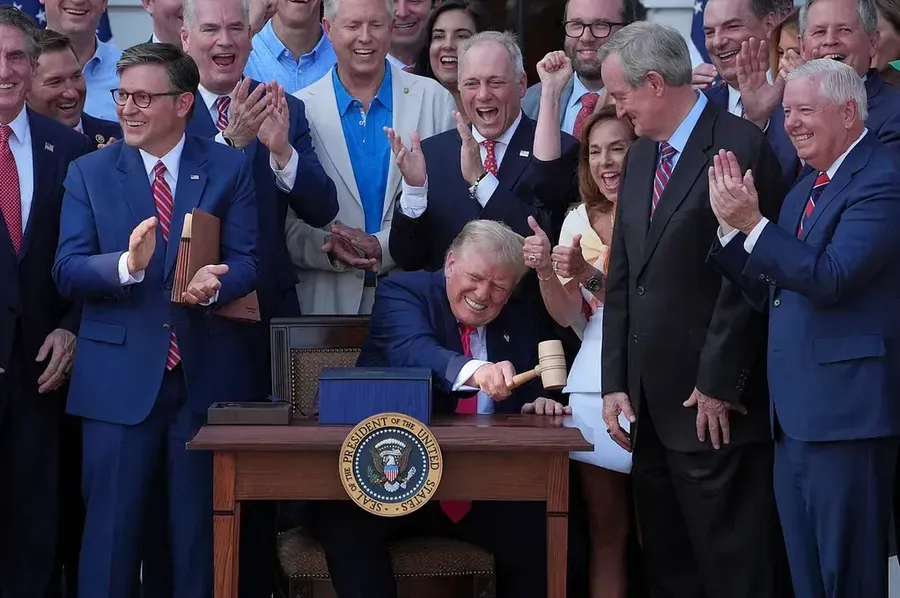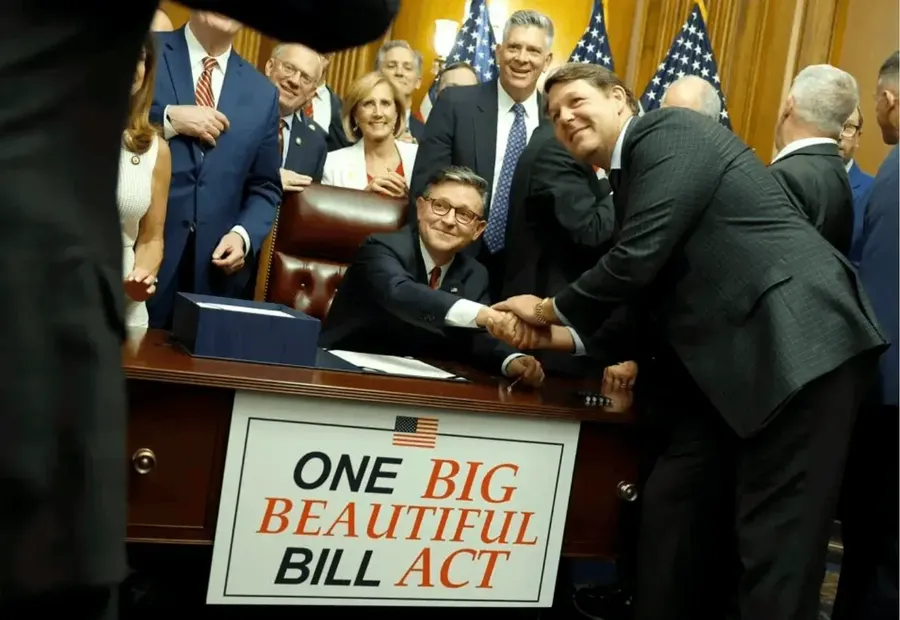How Beautiful Is It? A Closer Look at President Trump’s Big Bill
by u/Menu-False
On July 4th, President Trump signed the so-called "Big Beautiful Bill," or BBB, into law. The legislation, backed by 50 Republican senators and 218 Republican House members, extends the 2017 Tax Cuts and Jobs Act (TCJA), raises the SALT (State and Local Tax) deduction cap established under the TCJA, scales back Medicaid and SNAP benefits, and includes several other significant provisions. Republicans who opposed the bill included Thomas Massie, Brian Fitzpatrick, Susan Collins, Rand Paul, and Thom Tillis. One moderate Republican senator, Lisa Murkowski, only decided to support the bill after securing key concessions on health and nutrition programs for Alaska, the state she represents. After voting for the bill, Murkowski told reporters "Did I get everything I wanted? Absolutely not... We do not have a perfect bill by any stretch of the imagination. My hope is that the House is going to look at this and recognize that we're not there yet." However, the House later passed the same version of the bill she had voted for.

President Donald Trump bangs a gavel presented to him by House Speaker Mike Johnson of La., after he signed his signature bill of tax breaks and spending cuts at the White House, Friday, July 4, 2025, in Washington. (AP).
According to the Congressional Budget Office (CBO), the legislation will add $3.3 trillion to the U.S. national debt. This projected increase contributed to the public fallout between Donald Trump and Elon Musk prior to the bill’s passage. Musk had openly criticized the bill, prompting Trump to respond at a press conference: "Elon is upset because we took the EV mandate, which was a lot of money for electric vehicles. They're having a hard time—the electric vehicles—and they want us to pay billions of dollars in subsidy." Following this exchange, Musk announced plans to form a new political party, the "America Party", and has threatened to primary all Republicans who supported the bill.
A central component of the BBB is a set of tax cuts that predominantly benefit the wealthy. These include a lower marginal tax rate for individuals earning over $400,000, an increase in the estate tax exemption, and a higher standard deduction, which disproportionately benefits higher-income households. Interestingly, the bill increases the SALT deduction cap from $10,000 to $40,000. This change is especially advantageous for individuals making over $100,000 in high-tax, typically blue states—a surprising move given that Trump originally imposed the $10,000 cap during his first term. Other than the SALT cap adjustment, the bill largely maintains existing tax rates, effectively making them permanent. It also includes a modest increase in the standard deduction and introduces additional deductions for tip earners, individuals receiving overtime pay, and those over the age of 65. However, these changes are temporary and primarily benefit the 60% of American households that currently pay federal income taxes.
In addition to tax changes, the BBB enacts significant reductions to social welfare programs. It cuts $1 trillion in healthcare spending, largely from Medicaid. The Congressional Budget office estimates that the bill will result in 17 million Americans losing health insurance coverage by 2034. Furthermore, the bottom 10% of earners are projected to lose non-cash government benefits worth an average of $1,600 annually. The bill raises copays for Medicaid enrollees to as much as $35 for some services and imposes new administrative requirements. Enrollees must now verify that their income remains below a certain threshold every six months and must demonstrate that they are working, attending school, or volunteering at least 80 hours per month.

U.S. Speaker of the House Mike Johnson (R-LA) shakes hands with Rep. Jodey Arrington (R-TX) alongside fellow House Republicans during an enrollment ceremony for H.R. 1, the One, Big, Beautiful Bill Act at the U.S. Capitol on July 03, 2025 in Washington, DC. (Forbes).
These administrative burdens have proven problematic in the past. In Arkansas, for example, similar requirements led to widespread loss of coverage due to communication failures. Research indicates that such mandates do not significantly increase employment. The CBO estimates that 4.8 million Americans will lose insurance coverage due to the BBB's work requirements—more than double the roughly 2 million Medicaid recipients who are not working or exempt. Many of those affected are already receiving unemployment benefits, which should qualify as an exemption.
The legislation also reduces Medicaid reimbursements to hospitals by $665 billion—an 18.2% decrease. This is partly due to the rise in uninsured individuals, which increases uncompensated care costs, and partly due to a crackdown on state-directed payments used to boost Medicaid reimbursement rates to levels comparable to Medicare.
State budgets will also feel the impact. The bill restricts the use of provider taxes, which states levy to trigger federal matching funds. The steepest funding reductions will be seen in Montana, with a projected 21% decline in federal and state Medicaid funds, followed closely by Arizona, Kentucky, and Virginia, each facing an 18% reduction.
The Affordable Care Act (ACA) marketplace is also affected. Enhanced subsidies introduced under the American Rescue Plan during the Biden administration are set to expire. These subsidies have reduced annual premium costs by an estimated $705. The CBO warns that their expiration could result in millions of Americans losing coverage. Additionally, ACA policyholders must now update their information annually instead of being automatically re-enrolled, adding another layer of administrative burden.
The BBB further reduces funding for the Supplemental Nutrition Assistance Program (SNAP). The work requirement age has been increased to 64, up from 54, and parents with children aged 14 or older must also meet work requirements. For the first time, states will be required to contribute funding to SNAP, which has historically been federally funded.
These combined cuts to Medicaid and SNAP are expected to have broader economic consequences. SNAP has a GDP multiplier of 1.54, meaning every dollar spent adds $1.54 to the economy. Medicaid's multiplier is estimated at 2.0. Reducing these programs could lead to job losses and slowed economic growth.
Beyond welfare and tax reforms, the BBB also eliminates green energy subsidies, dramatically increases funding for Immigration and Customs Enforcement (ICE), and boosts defense spending. Whether you find it karmic or terrifying, one conclusion is clear; it is that low-income Americans will bear the brunt of this legislation's impact.